Key takeaways:
- Home automation enhances convenience, energy efficiency, and security in everyday life.
- Effective home security systems provide peace of mind and protect not only property but also loved ones.
- Compatibility and user-friendliness are crucial factors when selecting smart locks for home automation.
- Lock security ratings, such as those from ANSI and UL, are important for ensuring durability and effectiveness in protecting homes.
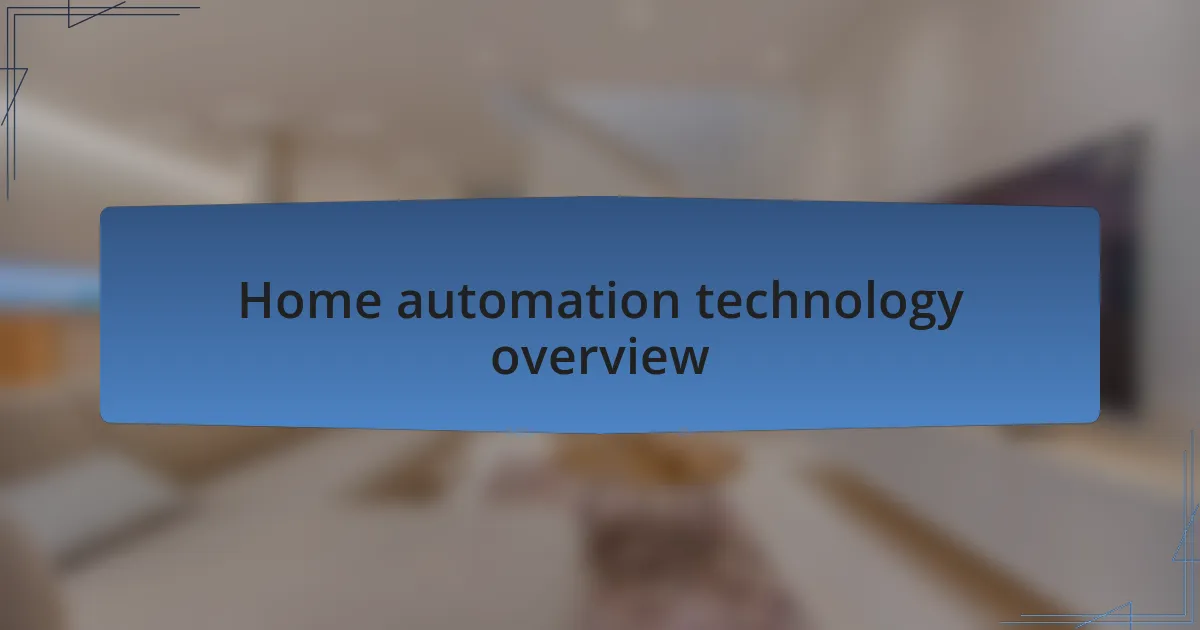
Home automation technology overview
Home automation technology represents a transformative shift in how we interact with our living spaces. I still remember the first time I upgraded my home with smart devices; it felt like stepping into the future. Imagine controlling your lights, thermostat, and security systems all from the palm of your hand—it’s not just a convenience; it brings a sense of security and comfort that’s hard to overstate.
At its core, home automation integrates various systems to streamline daily routines and improve efficiency. Think about those moments when you’re rushing out the door and can quickly lock your doors or adjust the temperature from your smartphone. Doesn’t that sound appealing? This kind of technology simplifies life, allowing you to focus on what truly matters, like spending time with loved ones or pursuing hobbies.
As I explore smart home features, I often ponder the potential impacts on energy consumption and security. With smarter technology, I’ve found that I can not only save on energy bills but also enhance the security of my home. Isn’t it fascinating how these advancements can create a more sustainable and safer living environment?
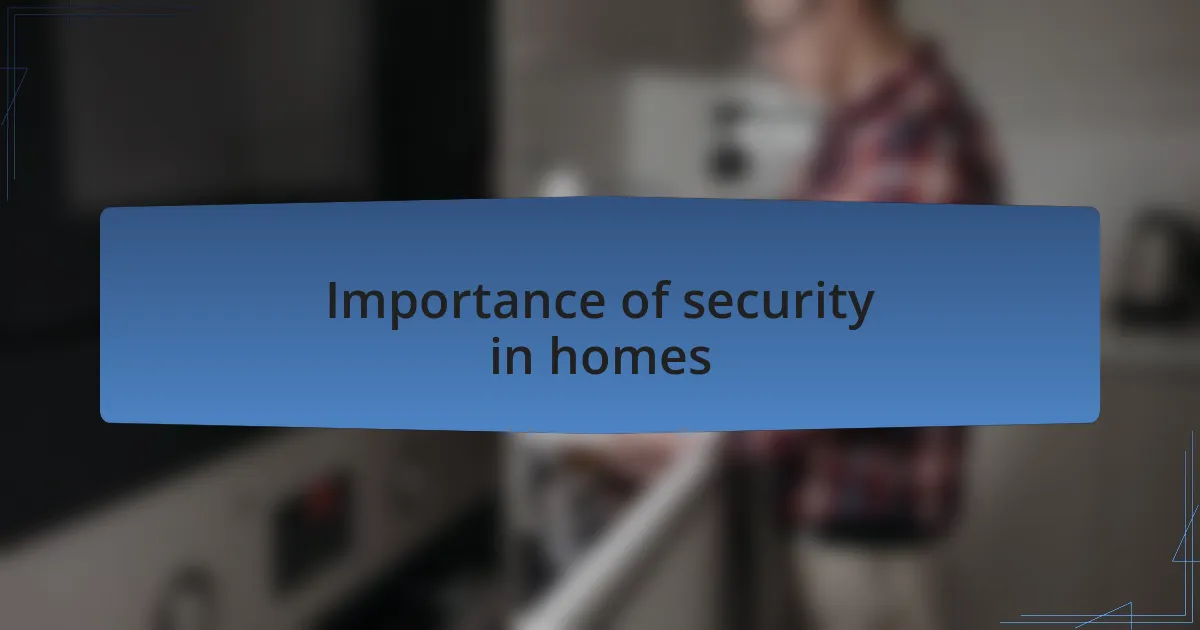
Importance of security in homes
When I think about home security, it’s hard not to remember that unsettling feeling of being away from home. I once left for a weeklong vacation, constantly wondering if I’d locked the front door. It turns out that having a reliable security system in place not only protects your property but also brings peace of mind, allowing you to fully enjoy your time away without the nagging worry of potential threats.
Security isn’t just about preventing break-ins; it’s also about ensuring the safety of your loved ones. I recall a time when a neighbor’s home was broken into while they were asleep. The fear and anxiety that rippled through our community were palpable. This incident reinforced my belief that robust security measures play a crucial role in safeguarding not only our belongings but also the well-being of those we care about.
Moreover, effective home security can deter criminal activity in neighborhoods, creating a safer environment for everyone. Just last summer, I participated in a neighborhood watch meeting where we discussed the positive impact of visible security measures. Have you ever taken a moment to consider how a well-secured home can enhance the overall safety of your community? I truly believe that investing in home security contributes to a collective sense of safety that extends far beyond our individual homes.
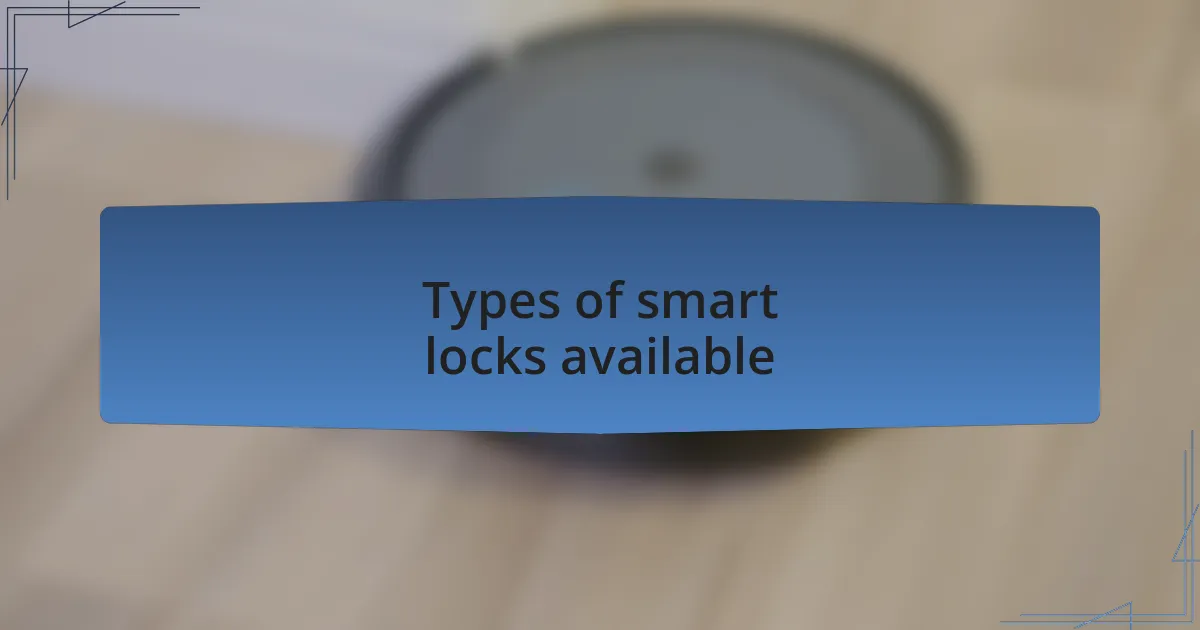
Types of smart locks available
When exploring the types of smart locks available, I often find myself drawn to keyless entry systems. These locks allow you to unlock your door using a smartphone app or a keypad, eliminating the need for physical keys altogether. The first time I used a keyless entry lock, I marveled at the convenience of never having to fumble for my keys at the front door when my hands were full of groceries—it was a game changer!
Another fascinating option is the smart deadbolt, which offers enhanced security through advanced locking mechanisms and can typically be controlled remotely. I remember installing one at my home; the ability to lock and unlock the door from anywhere gave me newfound confidence. Have you ever been halfway to your car and suddenly realized you forgot to secure the door? With a smart deadbolt, the stress of such a moment evaporates as I simply pull out my phone to ensure the door is locked.
For those who appreciate cutting-edge technology, smart locks with biometric features, like fingerprint recognition, are truly intriguing. I once visited a friend who had this type of lock, and I was amazed by how quickly it granted access. It felt like stepping into the future! I can’t help but wonder: Do you think the combination of convenience and security outweighs concerns about technology reliance? From my perspective, these innovations not only simplify our lives but also enhance our home’s safety profile.
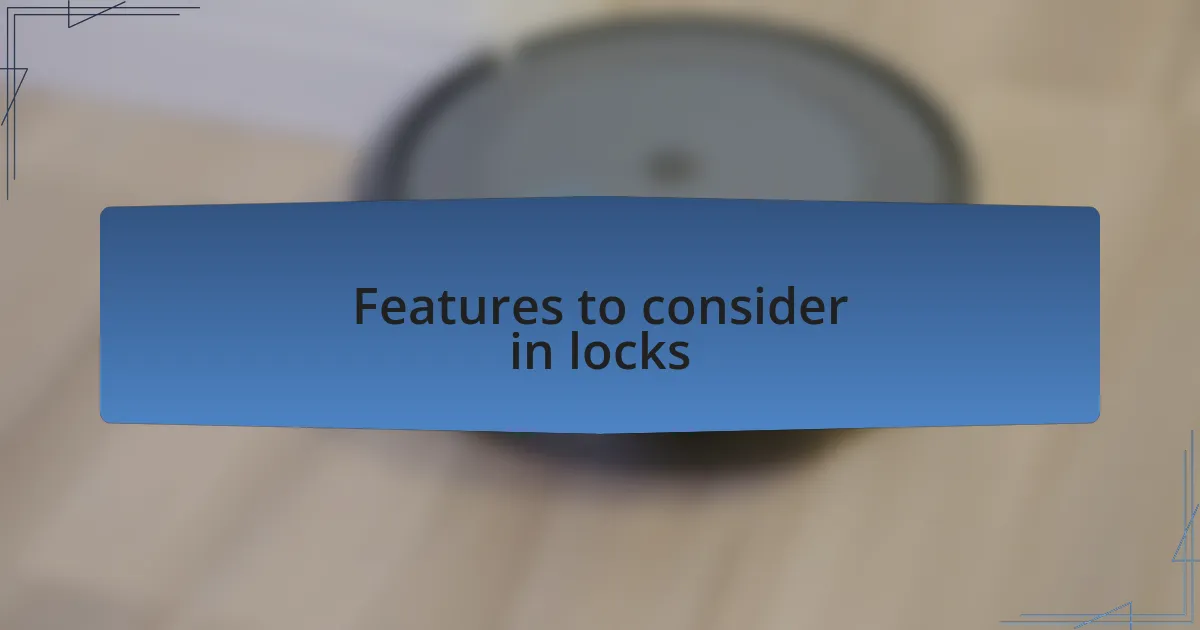
Features to consider in locks
When selecting locks for your home, security features should always be a top priority. I recall a time when I chose a lock without thoroughly evaluating its durability, only to realize weeks later that it wasn’t as sturdy as I had hoped. I felt a touch of regret because I value peace of mind. A lock should withstand attempts to tamper or break-in, ensuring that my home remains a safe haven.
Another critical aspect to consider is connectivity options. I’ve encountered smart locks that offer Wi-Fi and Bluetooth capabilities, which provide different levels of control and convenience. For instance, while Wi-Fi allows remote access from anywhere, Bluetooth typically requires my phone to be nearby. I remember feeling inspired when I connected a lock to my home automation system; it was empowering to manage security from a single app. Have you ever experienced the relief of knowing you can monitor access to your home in real-time?
Additionally, user-friendliness cannot be overstated. I once tried a smart lock that promised high-tech features but was frustratingly complicated to set up. The lock had so many options that I almost gave up! Simplicity in design not only enhances functionality but also makes daily use far more enjoyable. After all, who wants to struggle with technology when security should be a straightforward protection process?
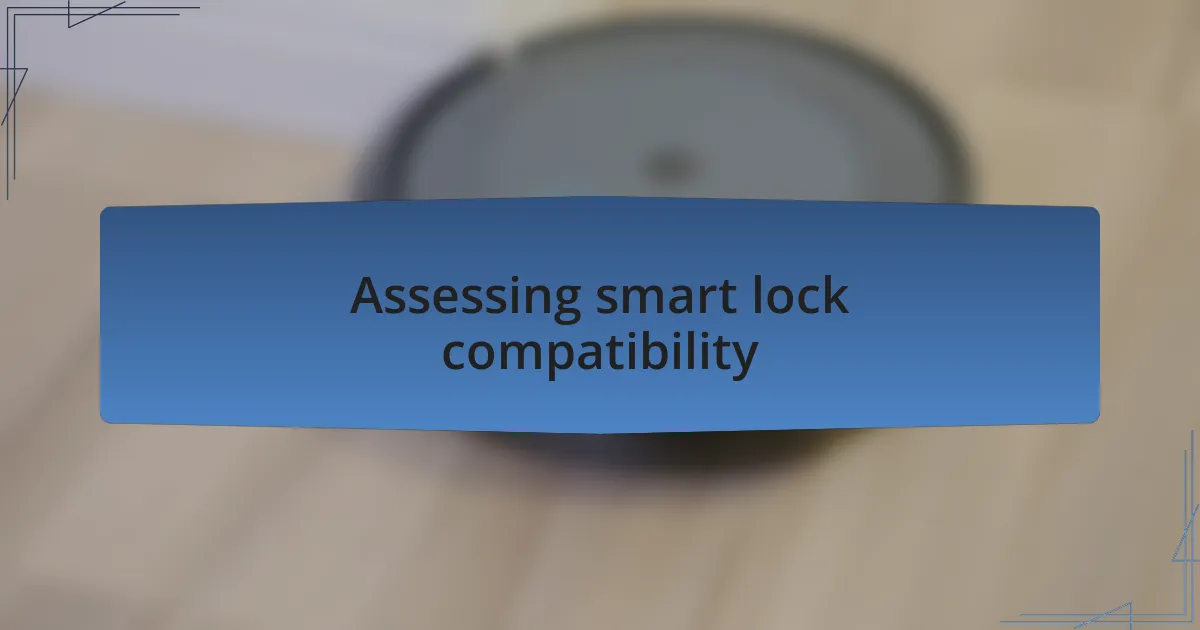
Assessing smart lock compatibility
When assessing smart lock compatibility, it’s essential to consider how well the lock integrates with your existing home automation systems. I remember installing a smart lock that claimed to be versatile, but I was left frustrated when it wouldn’t sync with my home hub. It made me realize that not all smart locks are created equal in terms of interoperability. Have you ever had that sinking feeling of excitement turn to disappointment because you didn’t verify compatibility first?
Another factor is the type of door and hardware you have. I once overlooked this detail and purchased a sleek smart lock that was simply incompatible with my door’s size and shape. The installation process turned into a tedious endeavor that required additional modifications. Isn’t it a hassle when a simple choice leads to unforeseen complications? Ensuring the lock fits your door properly can save you from unnecessary stress and expense down the line.
Finally, you should check if the lock supports the protocols used by your devices. When I chose a smart lock that only worked with Z-Wave but my devices were mainly on Zigbee, it felt like hitting a brick wall. It made me realize how crucial it is to match protocols for seamless operation. Ever faced a situation where your technology just wouldn’t communicate? Ensuring compatibility at this level is key to enjoying a smooth and efficient home automation experience.
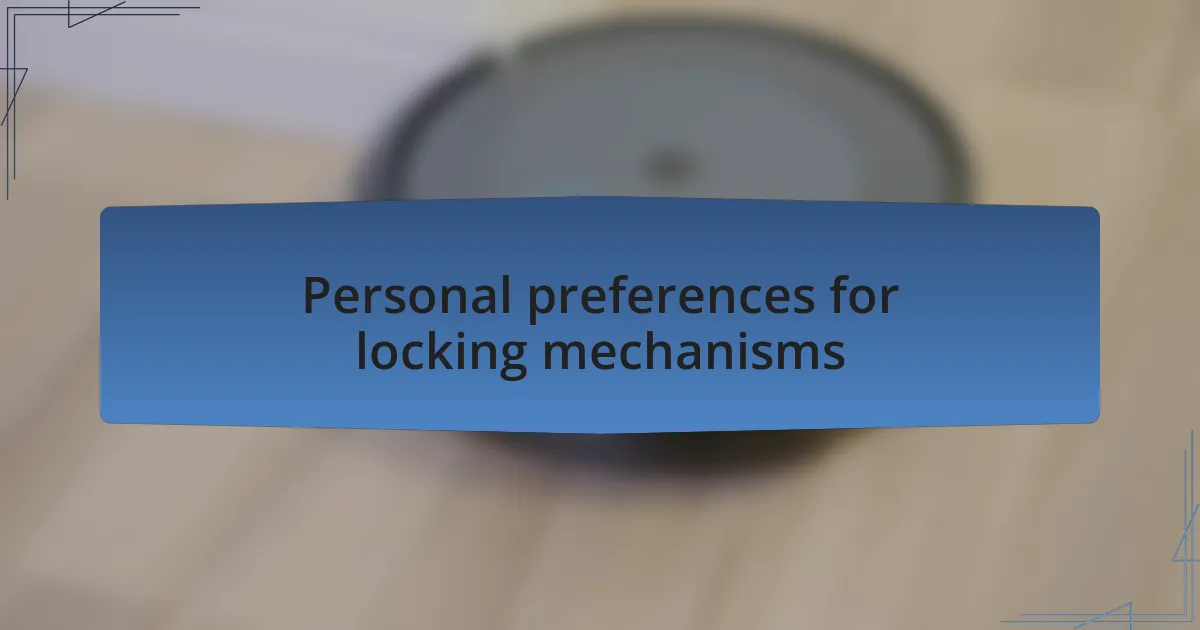
Personal preferences for locking mechanisms
When selecting locking mechanisms, I often lean towards keyless options because they align perfectly with my lifestyle. I vividly recall a moment when I ran out the door, only to realize I left my keys inside. That panic taught me the value of keyless entry. Imagine the convenience of just typing in a code or using your smartphone instead of fumbling for keys!
I also have a soft spot for locks that offer customizable access codes. This feature reminds me of a time when I needed to grant a friend access while I was away. It felt empowering to manage who could enter my home without having to hand over a physical key. Have you ever wished you could share access without the fuss of coordinating key exchanges? This ability enhances security while maintaining a level of control that I find reassuring.
Aesthetics also play a role in my locking mechanism preferences. I once settled for a functional lock that clashed with my home’s overall design, and it drove me nuts every time I walked in. The right lock should not only work well but also blend seamlessly with your decor. Isn’t it rewarding when practicality meets style? Choosing a lock that complements your home’s aesthetic can significantly enhance your overall satisfaction.
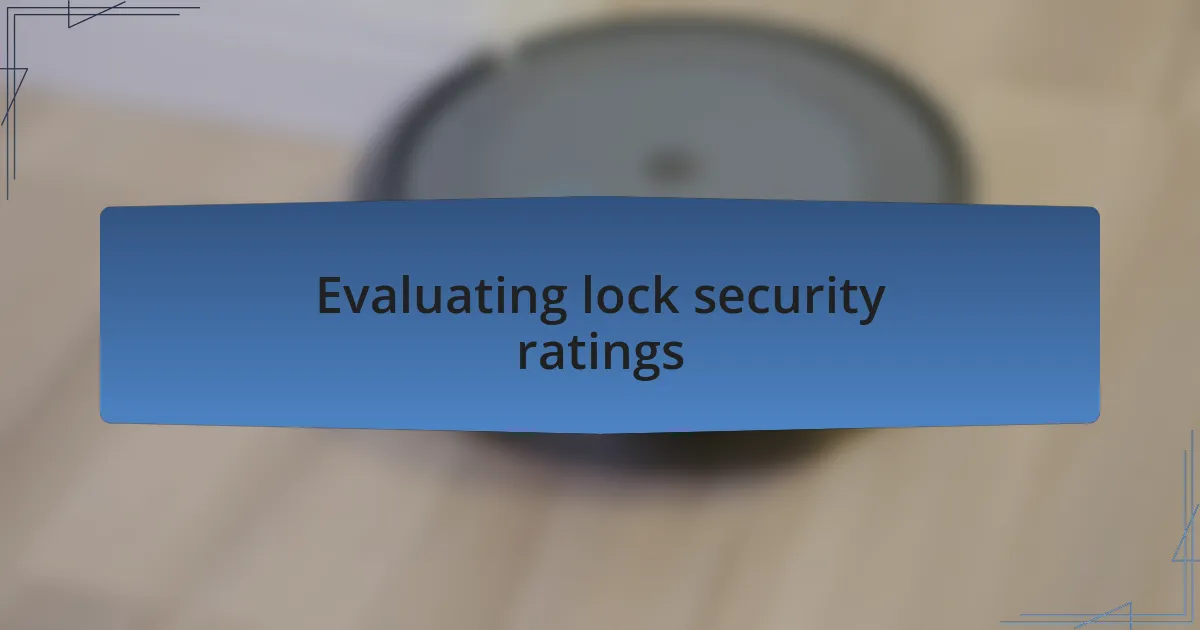
Evaluating lock security ratings
When I look at lock security ratings, I find it crucial to assess their grading. For instance, the American National Standards Institute (ANSI) provides a rating system, with Grade 1 being the highest. I remember when I learned this during my quest for a new home security system; it made a world of difference. Why settle for anything less than a Grade 1 lock when your peace of mind is at stake?
Additionally, I always check for certification by organizations like Underwriters Laboratories (UL). A UL-listed lock offers a level of assurance regarding its durability and security performance. I once invested in a UL-approved deadbolt, and it truly boosted my confidence in my home’s safety. Isn’t it reassuring to know your lock has been rigorously tested to withstand break-in attempts?
Lastly, I pay close attention to user reviews and experiences regarding lock performance in real-world conditions. There was a time I opted for a highly-rated lock based solely on marketing claims, only to discover it didn’t stand up to daily use. Have you ever experienced that disappointment too? Evaluating real feedback can save you from potential regret and provide insights that ratings alone might not convey.